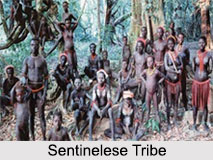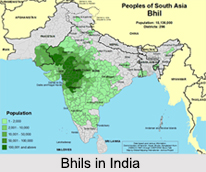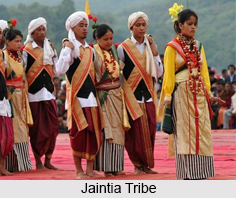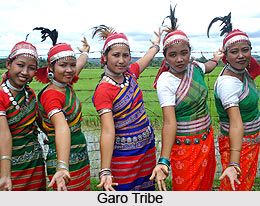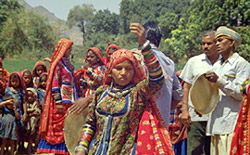Pahan is the religious head of the Munda Tribe and acts as a representative of the villagers. He is relegated the duty of propitiation of several deities of the Munda pantheon and offering sacrifices to them on behalf of the villagers. The Mundas believe him to be an intermediary between the gods and the commoners. The Pahan offers sacrifices to the gods and the spirits to invoke their blessings for the welfare of the people. Pahan is also referred to as Baiga.
Pujar or Panbhara
The service of the Pujar is to assist the Pahan in his official activities. During sacrifice the duty of the pujar is to fetch water from a nearby stream or river, to clean and plaster the appointed site of sacrifice with cow dung and to roast the sacrificial fowl at the Sarna or at the Pahan`s house. Few villages also term the Pahan as the Tahlu.
Status of the Pahan
Formerly the Pahan was the head man of the village but with time he was required to attend to the foreign rulers for depositing taxes and to tackle other problems of the village. He however, found it derogatory for him to report in person to the rulers and hence sent a person, later called the Munda, as his representative. The Mundas gradually came in contact with the officers and received an influential position in the village affairs. Thus, the Pahan lost his position and the Munda was recognised as the village head. Thus two divisions were created in the village one supported the Munda and the other supported the Pahan. Later a compromise was sought for where both of them were recognised jointly as the village heads.
Pahan holds his position by right of birth and the position in most of the villages is hereditary. After the death of the Pahan his eldest son becomes Pahan. To be a Pahan the person concerned must belong to the descendants of the Khuntkattidars of the village. In case the Pahan is childless the post of the Pahan is given to one of his nearest bhayads. If the family of a Pahan becomes extinct the new incumbent is elected from among the Khuntkattidars of the village.
There are few villages, meagre in number, where the post of Pahan is not hereditary, thus necessitating the election of a Pahan. On an appointed day people assemble at the Sarna. Few villager members bring the old winnowing shovel while a new one is brought by the Pahan in which rice grains are kept. A bachelor, from among audience is selected, his eyes are blind folded with cloth and the old soop is handed over to him. The old Pahan follows him with new soop and a jug of water. With his eyes blind folded he moves towards the village and the individual at whose door he stops is elected as the Pahan. It is believed that he is elected by the Sarna deity because it is deemed that the deity had led the young adult with the soop at the door of the elected person.
Duties of the Pahan
The Pahan being the religious head of the village Munda community presides over all the religious liabilities and assets. He is relegated with the duty of invoking gods and other tutelary spirits and offering them sacrifices on the occasion of Batauli Sarhul, Kolomsing and Megeparab. It is believed by the Mundas that as they lack the power to directly communicate with the gods, the power only inherent in the Pahan only, all the religious activities are executed by him. The complete village speaks and communicated through him. The Pahan invokes blessings from the gods and other deities for the welfare and safety of the villagers. He prays them to protect the villagers and its residents to save them from the venomous snakes, wild beasts, dangerous diseases, harmful insects and other catastrophe they might happen and cause destruction. However, the Pahan does not solemnize as the religious head of all the feasts and sacrifices conducted in the village. Some sacrifices and feasts are performed on the community level. The Pahan does not offer sacrifices on occasion such as Phagu feast or Sohrai festival.
In case an epidemic has broken out among men or among cattle in the village, it is beyond Pahan`s powers to pacify the anger of the deity who has caused the epidemic. During such times remedy is taken from the witch-finder. However, if an epidemic has broken out in the neighbouring village the Pahan can perform sacrifices or rituals praying and promising on behalf of the community that if the village remains safe from the epidemic he would offer sacrifices and performs after the village becomes immune. Thus, it can be stated that he can prevent an epidemic from breaking out but cannot ward it off when once it has broken out.
The duty of the Pahan is to offer sacrifices to the concerned deities at the commencement of each Jatra or fair. The Pahan appoints the date of the observance of the feast public. He also helps in removing several kinds of restrictions that are imposed during observance of rituals. If a man wishes to cut down or use in any way a certain tree of the Sarna, or thinks of catching the fishes from a pool where the Ikirbonga resides he will have to take permission from the Pahan or else it might least enrage the deity concerned resulting in his death or some illness.
The Pahan also helps in providing directions to the person concerned in offering a sacrifice before the deity. The Pahan again offers sacrifice before the work is performed on behalf of the person. When a small tola is formed outside a separate village a new Pahan is to be appointed there if the people of the tola belong to a different clan from that of the people of the main village. In such a situation the old Pahan cannot interfere in the election of a new Pahan but if the people belong to dame clan then no new Pahan is elected without the prior approval of the village Pahan. To differentiate between the two Pahans, the Pahan of the main village is referred to as Marung Pahan and that of the total is called the Tolapahan.
Equipments of Pahan
The most common of the equipments used by the Pahan during sacrificial rituals are the Sarna Sup and the sacrificial knife used for beheading the sacrificial fowl. The Sarna Sup is carefully hung on a keel of the roof known as the chala khuti.
Training of Pahan
The Pahan receives his training about the sacrificial formula from his father when he served as the Pahan. He is to accompany his father to the sacrificial rituals where he learns from him all the chants and incantations required for such occasions. In absence of the Pahan his eldest son assumes the role of the Pahan.
Privileges of Pahan
Pahnai or the Dali Katari, a separate piece of land is presented to the Pahan by the villagers as a remuneration of his services.
Bhutkheta of Pahan
Bhutkheta are the lands believed to be the seat of the village bhuts i.e. malevolent spirits. Bhutkheta is again sub-divided into the classes, Bhutkheta proper and Bhuinhari Bhutkheta. The Pahan cultivates the former class of land and the products are uased in propitiating and offering sacrifices to the village bhuts. This land is usually attached to the Pahan`s office and following his death it is transferred to the next incumbent. The latter class of land is possessed by the residents of the bhuinhari khunt. The products are utilised in offering sacrifices to the family bhuts.
Pahnai or Dali Katari of Pahan
These lands are the property of the village community and are bestowed to the Pahan as remuneration for the services of religious duties. The Dali Katari land is not the property of the Pahan hence he cannot sell it or distribute it among his bhayads. The Dali Katari land is rent free. Neither government nor the local Zamindar can realise tax against this land.
Panbhara of Pahan
These lands are donated to the Pahan`s assistant, Panbhara as remuneration for assisting the Pahan in his sacrificial work. These lands are also non transferable and rent free. Besides this, the Mahtoi Mundai is another piece of land owned by the Mahtos or the Mundas, the village headman.
Geirahi Holdings
Geirahi holding is same as Bhutkheta and are the service lands at the disposal of the Munda or the Pahan. The products from these lands are utilised in specified sacrifices. Apart from this there are Mardana lands that are more or less the same as Geirahi. The only difference is that the woman cannot claim any share on these lands.

















